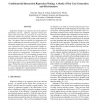Free Online Productivity Tools
i2Speak
i2Symbol
i2OCR
iTex2Img
iWeb2Print
iWeb2Shot
i2Type
iPdf2Split
iPdf2Merge
i2Bopomofo
i2Arabic
i2Style
i2Image
i2PDF
iLatex2Rtf
Sci2ools
141
click to vote
ICSM
2007
IEEE
2007
IEEE
Combinatorial Interaction Regression Testing: A Study of Test Case Generation and Prioritization
Regression testing is an expensive part of the software maintenance process. Effective regression testing techniques select and order (or prioritize) test cases between successive releases of a program. However, selection and prioritization are dependent on the quality of the initial test suite. An effective and cost efficient test generation technique is combinatorial interaction testing, CIT, which systematically samples all t-way combinations of input parameters. Research on CIT, to date, has focused on single version software systems. There has been little work that empirically assesses the use of CIT test generation as the basis for selection or prioritization. In this paper we examine the effectiveness of CIT across multiple versions of two software subjects. Our results show that CIT performs well in finding seeded faults when compared with an exhaustive test set. We examine several CIT prioritization techniques and compare them with a re-generation/prioritization technique. ...
Related Content
| Added | 03 Jun 2010 |
| Updated | 03 Jun 2010 |
| Type | Conference |
| Year | 2007 |
| Where | ICSM |
| Authors | Xiao Qu, Myra B. Cohen, Katherine M. Woolf |
Comments (0)

